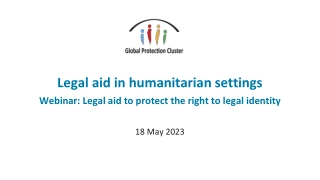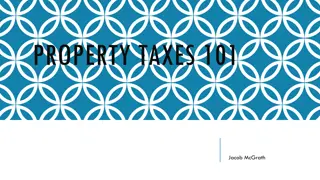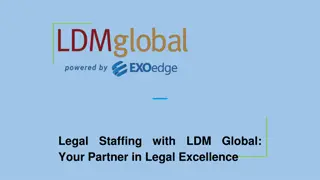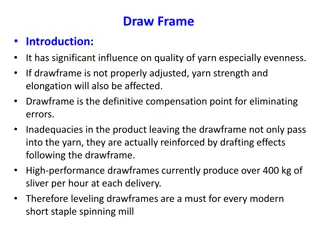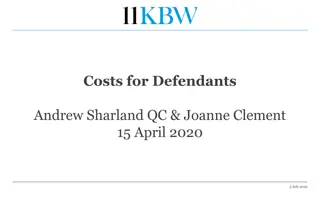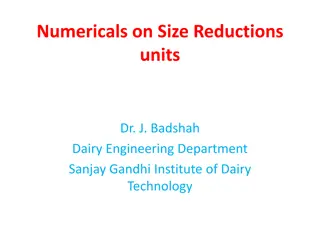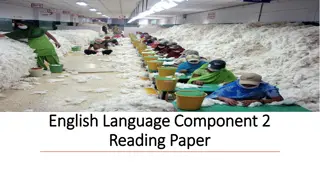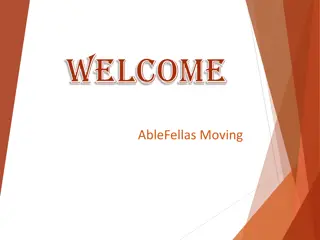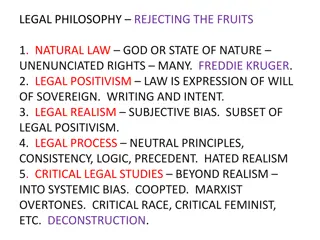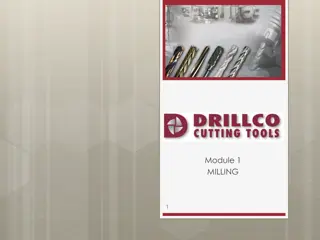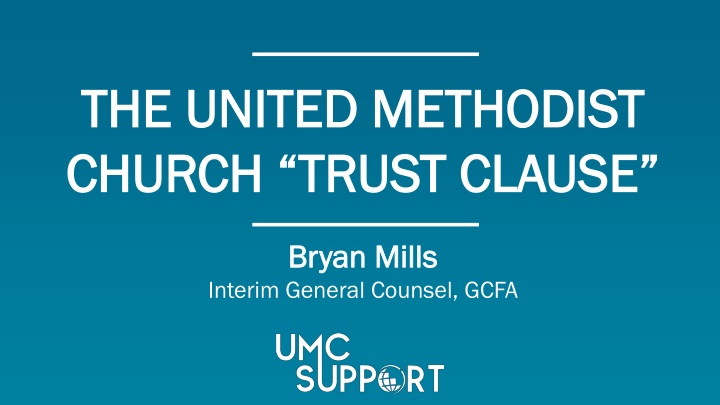
The United Methodist Church Trust Clause and Its Historical Significance
Explore the United Methodist Church Trust Clause, which holds all properties in trust for the denomination. This historical practice, dating back to John Wesley, ensures accountability and connection within the denomination, encompassing all assets from buildings to investments. Dive into the significance and irrevocable nature of this trust requirement, essential in United Methodism's structure.
Download Presentation

Please find below an Image/Link to download the presentation.
The content on the website is provided AS IS for your information and personal use only. It may not be sold, licensed, or shared on other websites without obtaining consent from the author. If you encounter any issues during the download, it is possible that the publisher has removed the file from their server.
You are allowed to download the files provided on this website for personal or commercial use, subject to the condition that they are used lawfully. All files are the property of their respective owners.
The content on the website is provided AS IS for your information and personal use only. It may not be sold, licensed, or shared on other websites without obtaining consent from the author.
E N D
Presentation Transcript
THE UNITED METHODIST THE UNITED METHODIST CHURCH TRUST CLAUSE CHURCH TRUST CLAUSE Bryan Mills Bryan Mills Interim General Counsel, GCFA
All Titles In Trust All All properties of United Methodist local churches and other United properties of United Methodist local churches and other United Methodist agencies and institutions are held, in trust, for the benefit Methodist agencies and institutions are held, in trust, for the benefit of the entire denomination, and ownership and usage of church of the entire denomination, and ownership and usage of church property is subject to the property is subject to the Discipline Discipline. ( 2501.1 . ( 2501.1) ) The The denomination s trust interest is irrevocable: denomination s trust interest is irrevocable: The trust is and always has been irrevocable, except as provided in the Discipline. Property can be released from the trust, transferred free of trust or subordinated to the interests of creditors and other third parties only to the extent authority is given by the Discipline. ( 2501.2) 2
Scope All All really means all: really means all: [T]itles to all real and personal, tangible and intangible property held at jurisdictional, annual, or district conference levels, or by a local church or charge, or by an agency or institution of the Church, shall be held in trust for The United Methodist Church and subject to the provisions of its Discipline. ( 2501.1) Not Not just the building and the land, but also bank just the building and the land, but also bank accounts, furniture, office equipment, investments, accounts, furniture, office equipment, investments, hymnals, etc. hymnals, etc. 3
History This This trust requirement is an essential element of trust requirement is an essential element of the historic polity of The United Methodist Church the historic polity of The United Methodist Church . . . . It reflects the connectional structure of the . . . . It reflects the connectional structure of the Church . . . . [It] is thus a fundamental expression Church . . . . [It] is thus a fundamental expression of United Methodism whereby local churches and of United Methodism whereby local churches and other agencies and institutions within the other agencies and institutions within the denomination are both held accountable to and denomination are both held accountable to and benefit from their connection with the entire benefit from their connection with the entire worldwide Church. ( 2501.1) worldwide Church. ( 2501.1) 4
History The The concept dates all the way back to John concept dates all the way back to John Wesley He He understood that if the local church had unfettered control of understood that if the local church had unfettered control of the church property, that control would extend to the pulpit itself, the church property, that control would extend to the pulpit itself, giving the local church the ability to exclude the bishop s pastoral giving the local church the ability to exclude the bishop s pastoral appointments appointments In 1750, Wesley tasked three lawyers with crafting deeds for three Methodist preaching houses Those deeds served as models and predecessors for the language adopted by the General Conference in 1796 That trust clause was first published in the Discipline in 1797 Wesley 5
The Trust Clause(s) 2503: all written instruments of conveyance by which premises 2503: all written instruments of conveyance by which premises are held or hereafter acquired for use as a place of divine worship or are held or hereafter acquired for use as a place of divine worship or other activities for members of The United Methodist Church shall other activities for members of The United Methodist Church shall contain the following trust clause: contain the following trust clause: In trust, that said premises shall be used, kept, and maintained as a place of divine worship of the United Methodist ministry and members of The United Methodist Church; subject to the Discipline, usage, and ministerial appointments of said Church as from time to time authorized and declared by the General Conference and by the annual conference within whose bounds the said premises are situated. This provision is solely for the benefit of the grantee, and the grantor reserves no right or interest in said premises. 6
The Trust Clause(s) There There are also clauses for (1) parsonages, (2) property that is are also clauses for (1) parsonages, (2) property that is not to be used exclusively for a place of worship, or a not to be used exclusively for a place of worship, or a parsonage, or both, and (3) property acquired from another parsonage, or both, and (3) property acquired from another UM entity UM entity If If the clause isn t in the deed, the denomination s trust interest the clause isn t in the deed, the denomination s trust interest still applies if: still applies if: the property was conveyed to a local UM church (or its board of trustees) or to a church of a UMC predecessor denomination; OR the local church uses UMC s (or a predecessor denomination s) name, customs, and polity in such a way as to be thus known to the community as a part of such denomination; OR the local church accepts a pastor appointed by the bishop or employed by the superintendent 7
Can It Be Released? From From 2501.2 2501.2: : Property can be released from the trust, transferred free of trust or subordinated to the interests of creditors and other third parties only to the extent authority is given by the Discipline. Via Via the signature of a district superintendent approving the signature of a district superintendent approving a local church real estate transaction a local church real estate transaction In the case of a mortgage, this signature would put the denomination s trust interest at a lower priority than that of the mortgage holder 2553 2553 A limited-scope exception to 2501 created by the 2019 General Conference 8
Is It Enforceable? Alpine Alpine v. Greater New Jersey AC (2014) v. Greater New Jersey AC (2014) One-time Methodist Episcopal local church changed its name to Alpine Community Church and attempted to leave the UMC with local church property oDeeds did not contain trust clause language Trial court granted summary judgment in favor of the conference, and the ruling was upheld on appeal Balt Balt. .- -Wash. AC v. Calvary Wash. AC v. Calvary ( (2015) 2015) Calvary UMC was discontinued by the conference oCongregation responded by changing the name and then continuing services, collection of funds, and use of bank accounts oDeeds did not contain trust clause language Trial court granted summary judgment in favor of the conference 9
Is It Enforceable? Desert Desert Southwest AC v. Camp Verde (2017) Southwest AC v. Camp Verde (2017) Trust clause language present in most or all of the original deeds oLocal church formed a new corporation, then transferred the real estate to it (leaving out the trust clause) Trial court held the trust clause applied and the transfers to the new corporation were void Florida Florida AC v. AC v. Bayshore Bayshore (2018) (2018) Bayshore UMC was closed by the conference oTrustees of the church refused to transfer the property to the conference and former members continued to use the property Trial court s summary judgment ruling held the conference owned the property 10
CONTACT 1 Music Circle N. Nashville, TN 37203 (615) 329-3393 legal@gcfa.org

